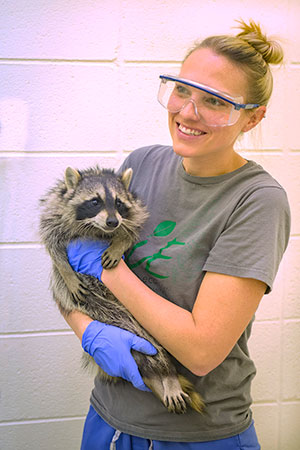
Contact Us
Institutional Communications
Bureau of Mines Building, Room 137
Laramie, WY 82071
Phone: (307) 766-2929
Email: cbaldwin@uwyo.edu
UW Raccoon Research Ties Temperament With Learning Ability
Published September 23, 2022

Lauren Stanton led raccoon research between August 2015 and September 2019 as a UW
graduate student. (UW Photo)
Results of a four-year University of Wyoming research project involving hundreds of raccoons in Laramie have been published, providing new insights into how wildlife adapts to change in urban settings.
Appearing in the Journal of Experimental Biology, the findings draw a connection between raccoons’ temperaments and their ability to learn how to obtain food.
The research was conducted between August 2015 and September 2019 by UW Ph.D. student Lauren Stanton, now a postdoctoral researcher at the University of California-Berkeley; her adviser, Sarah Benson-Amram, now a faculty member at the University of British Columbia-Vancouver; Eli Bridge, of the University of Oklahoma; and UW Ph.D. student Joost Huizinga, now with the OpenAI organization.
The researchers used live traps baited with cat food to humanely capture raccoons living in Laramie, says Stanton, who then transported the animals to the lab to assess their health and how feisty or docile they were. Then, Stanton injected a tiny radio frequency ID tag between the animals’ shoulder blades to individually identify them before returning the animals to their home territories, keeping track of their impulsivity by recording each time an individual ended up in a trap again.
Having tagged 204 raccoons between August 2015 and September 2019, Stanton and the team then tested how well the wild raccoons learned and adapted to change by locating a raccoon-sized cubicle in the animals’ neighborhood, equipped with two buttons: one that released a handful of tasty dog food treats when pressed and a second one that provided nothing. However, once each raccoon had overcome its misgivings and learned to climb inside the cubicle and obtain its edible reward, the team turned the tables on the animals, switching which button dispensed the dog food reward to find out how quickly the raccoons figured out the change.
Stanton admits that she and her colleagues had not factored in how popular the raccoon cubicle would be, with several animals often trying to crowd inside simultaneously, bumping and distracting the raccoon at the console as it tried to obtain its dog food.
After two years, 27 raccoons got the hang of visiting the cubicle, with 19 figuring out how to press the buttons to provide themselves with rewards and 17 realizing that they had to depress the other button when the team tried to outfox them.
Initially, the youngest raccoons seemed the keenest to explore the experimental cubicle; however, the adults were better prepared for adversity when the researchers switched the console buttons. And when they checked the animals’ temperaments, the least bold and most docile raccoons seemed best prepared to learn how to operate the console, “which suggests a potential relationship between emotional reactivity and cognitive ability in raccoons,” Stanton says.
However, when the researchers compared how the raccoons in Laramie coped, compared with the wild raccoons that tried out their paws in a peaceful lab, the captive animals seemed to pick up the test more readily. That is likely because there were more distractions and interruptions during testing in the natural conditions, Stanton says.
The researchers would like to see wildlife managers dealing with troublesome urban raccoons learn from their experience, warning that going after more proactive, bold individuals may exacerbate problems, as the calmer, more docile individuals that are left may be the true criminal masterminds.
Contact Us
Institutional Communications
Bureau of Mines Building, Room 137
Laramie, WY 82071
Phone: (307) 766-2929
Email: cbaldwin@uwyo.edu
